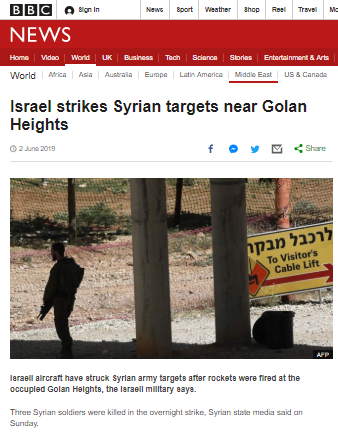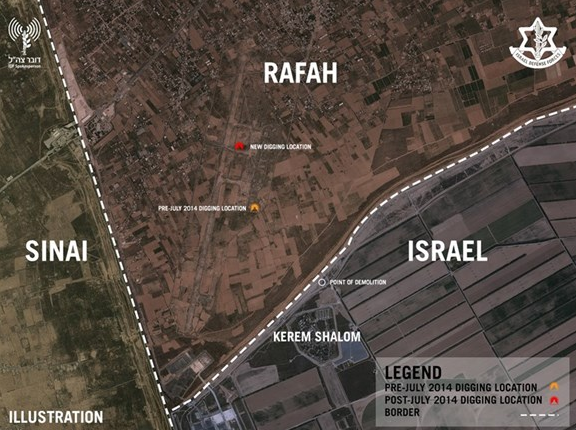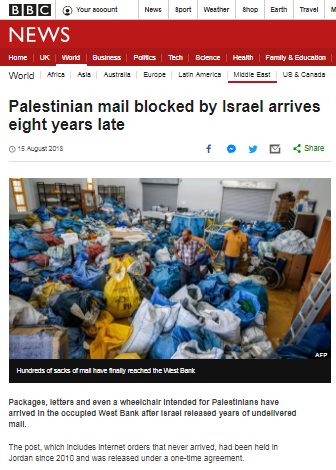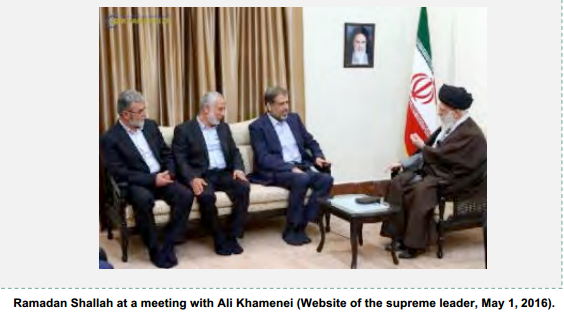Shortly after 8:45 p.m. on the evening of June 1st, two projectiles were fired from Syria towards the Golan Heights with one landing in an open area and the other falling short of the border.
Some 18 hours later the BBC News website published a report with a headline that told readers only of the Israeli response some seven hours after that attack – “Israel strikes Syrian targets near Golan Heights”.
The attack which sparked the incident was given barely half a sentence of coverage, with no details provided.
“Israeli aircraft have struck Syrian army targets after rockets were fired at the occupied Golan Heights, the Israeli military says.”
The report did however include a Tweet giving details of the targets in Syria later struck by Israel.
A previous incident which the BBC did not report at the time – May 27th – was also mentioned.
“On Monday, IDF said it had attacked a Syrian anti-aircraft system that fired on one of its warplanes. Syrian state media said one soldier had been killed in that incident.”
However readers were not informed that this is the second time this year that missiles have been fired from deep inside Syria at the northern Golan Heights – perhaps because that previous incident in January received scant and belated BBC coverage.
The majority of this report (69% of its total word count) is devoted to background including a lengthy section headed “What are the Golan Heights?”.
As usual, the BBC’s accounts of history begin in June 1967 with no mention of what happened before “Israel seized the Golan” or why it did so.
“Israel seized most of the Golan from Syria in the closing stages of the 1967 Middle East war, and thwarted a Syrian attempt to retake the region during the 1973 war.”
A photo caption tells BBC audiences that “Syria will not agree a peace deal with Israel unless it withdraws from the whole of the Golan” and the article goes on to state that:
“Syria has always insisted that it will not agree a peace deal with Israel unless it withdraws from the whole of the Golan. The last US-brokered direct peace talks broke down in 2000, while Turkey mediated in indirect talks in 2008.”
Readers are not told that Syria was offered precisely that in the 1990s and once again we see that the BBC has adopted the Syrian narrative, according to which demilitarised zones established under the 1949 armistice agreement are part of “the whole of the Golan”.
Since the US recognised Israel’s sovereignty over the Golan Heights earlier this year, the BBC has taken to using the same ‘international law’ mantra that it promotes concerning Israeli communities in Judea & Samaria and parts of Jerusalem also in relation to communities on the Golan – see previous examples here and here.
“There are more than 30 Israeli settlements in the Golan, which are home to an estimated 20,000 people. The settlements are considered illegal under international law, although Israel disputes this.”
The report closes with a claim also seen in previous reports:
“The settlers live alongside some 20,000 Syrians, most of them Druze Arabs, who did not flee when the Golan was captured.”
Obviously most of those people were not around 52 years ago “when the Golan was captured” (the total population of the four Druze communities in the northern Golan was around 7,400 in 1967) and so the sloppy claim that twenty thousand people “did not flee” is inaccurate.
Notably, we see that the BBC presumptuously portrays the Alawite residents of Ghajar – who are Israeli citizens – and the Druze residents of the northern Golan who have chosen to take Israeli citizenship as “Syrians”.
Related Articles:
Slapdash BBC News reporting of events in northern Israel and Syria
BBC News framing of Iranian activity in Syria continues
BBC’s Golan Heights profile misleads on water and borders




